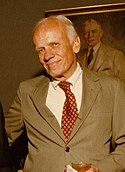Walker Percy Quote
Comes again the longing, the desire that has no name. Is it for Mrs. Prouty, for a drink, for both: for a party, for youth, for the good times, for dear good drinking and fighting comrades, for football-game girls in the fall with faces like flowers? Comes the longing and it has to do with being fifteen and fifty and with the winter sun striking down into a brick-yard and on clapboard walls rounded off with old hard blistered paint and across a doorsill onto linoleum. Desire has a smell: of cold linoleum and gas heat and the sour piebald bark of crepe myrtle. A good-humored thirty-five-year-old lady takes the air in a back lot in a small town.
Walker Percy
Comes again the longing, the desire that has no name. Is it for Mrs. Prouty, for a drink, for both: for a party, for youth, for the good times, for dear good drinking and fighting comrades, for football-game girls in the fall with faces like flowers? Comes the longing and it has to do with being fifteen and fifty and with the winter sun striking down into a brick-yard and on clapboard walls rounded off with old hard blistered paint and across a doorsill onto linoleum. Desire has a smell: of cold linoleum and gas heat and the sour piebald bark of crepe myrtle. A good-humored thirty-five-year-old lady takes the air in a back lot in a small town.
Related Quotes
About Walker Percy
Walker Percy, OblSB (May 28, 1916 – May 10, 1990) was an American writer whose interests included philosophy and semiotics. Percy is noted for his philosophical novels set in and around New Orleans; his first, The Moviegoer, won the National Book Award for Fiction.
Trained as a physician at Columbia University, Percy decided to become a writer after a bout of tuberculosis. He devoted his literary life to the exploration of "the dislocation of man in the modern age." His work displays a combination of existential questioning, Southern sensibility, and deep Catholic faith. He had a lifelong friendship with author and historian Shelby Foote and spent much of his life in Covington, Louisiana, where he died of prostate cancer in 1990.
Trained as a physician at Columbia University, Percy decided to become a writer after a bout of tuberculosis. He devoted his literary life to the exploration of "the dislocation of man in the modern age." His work displays a combination of existential questioning, Southern sensibility, and deep Catholic faith. He had a lifelong friendship with author and historian Shelby Foote and spent much of his life in Covington, Louisiana, where he died of prostate cancer in 1990.
